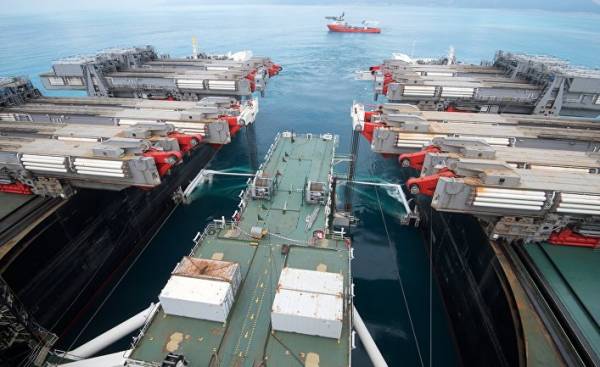
Somehow in the past month, the world’s largest ship squeezed through the narrow Strait of the Bosphorus that separates the European and Asian parts of Istanbul. Ship Pioneering Spirit, the length of which is approximately equal to the length of five Boeing 747s and which is broad enough to contain three football fields, passed under the Bosphorus bridge with a clearance of only a few meters.
He was heading to the Black sea, where he will participate in the construction of the gas pipeline “Turkish stream” between Russia and Turkey. Pipe-laying began in may, after only seven months after President Vladimir Putin and his Turkish counterpart Recep Tayyip Erdogan (Recep Tayyip Erdogan) have agreed to implement this project at a cost of 12.7 billion dollars.
This pipeline should begin operating in 2019, and one pipe will serve Turkish domestic market and the other will extend further to the South of Europe.
The rapid development of the project emphasizes the convergence that has occurred between Turkey and Russia over the last year. In relations between countries there is a serious tension after Turkish air force shot down a Russian fighter jet over the Syrian border in 2015.
However, even then the relationship between Russia and Turkey in the energy sector has not stopped, as said Gareth Winrow (Gareth Winrow), an independent analyst specializing in Turkish energy sector. “Both sides realize they need each other,” he added.
Putin has actively promoted the “Turkish stream”, as seen in this project an opportunity to expand access to the Turkish market, which last year became the second largest market for Russian natural gas after Germany, and closer to its strategic goal, namely, to supply gas bypassing Ukraine.
For Mr. Erdogan the prospect of a direct pipeline, which will connect Turkey with the vast energy reserves of Russia, is a more dubious benefit. Given that Turkey has little of its own fossil fuels, it needs reliable and affordable supplies to its economy continued to function.
Between 2005 and 2015, consumption of natural gas in Turkey grew on average by 4.4% per year — the highest growth rate in Europe — and its fast-growing needs are met largely at the expense of Russian gas. Meanwhile, during the same time period in Europe, according to a BP report, natural gas demand decreased on average by 0.4% per year.
Meanwhile, in the long term, Erdogan said Turkey’s dependence on Russia for more than half of its gas supply strategic risk. The official responsible for the diversification of energy supply, — the Turkish energy Minister Albayrak, Berat (Berat Albayrak), who is the son-in-law of Mr. Erdogan. Currently, he is gradually becoming the most influential politician in the country.
He and Mr. Erdogan were active in support of the new TRANS-Anatolian gas pipeline, which is due to open next year and which will connect Turkey with the giant Azerbaijani gas field “Shah Deniz” field, developed by BP. This project is part of a wider campaign of the European Union, aimed at reducing Europe’s dependence on Russian gas by creating supply routes from the Caspian basin via pipeline “southern gas corridor”.
The fact that the Turkish authorities at the same time support and “Turkish stream” and “southern gas corridor” is a reflection of Turkey’s foreign policy, torn between its ties with the West through NATO and its regional interests to the South and East.
Ankara hopes that the extension of the list of gas suppliers will give her the opportunity to negotiate with them to lower the price of the gas. In addition, it has long sought to acquire the status of centre of energy trade, where from Russia, Central Asia and the Middle East will be drained of gas, which then will be sent to European buyers.
Furthermore, now the possibility of building a pipeline that will connect Turkey with Israel and Northern Iraq and its leadership have laid the groundwork to import gas from other parts of the world, opened last year its first floating LNG terminal in the port of aliağa in the Aegean sea. This terminal is a relatively inexpensive infrastructure, Turkey is planning to build at least two of such terminal.
Analysts believe that domestic demand is not so high to justify such a rapid expansion of gas supply sources. They also doubt that the Turkish authorities will be able to conduct those market reforms that are needed to transform the country into a regional center.
Last year, gas consumption in Turkey fell by 3.7% against the backdrop of slowing economic growth and long-term growth in this market is likely to hinder the authorities ‘ desire to promote nuclear energy and energy from renewable sources and produced in Turkey brown coal as alternatives to imported gas.
Some analysts saw the “Turkish stream” Russia’s attempt to stifle alternative supply routes. “One of the goals is to undermine investments in Azerbaijan to Gazprom got the larger share, said Matthew Bryza (Matthew Bryza), former US Ambassador to Azerbaijan. — Russia is trying to weaken or take away the part of the “southern gas corridor””.
Meanwhile, Russia decided to protect themselves from the effects of the decline in Turkish demand for gas, making interest on investment of this country in nuclear energy. The Russian state company “Rosatom” is headed by the design process of a nuclear power plant at Akkuyu in southern Turkey. The construction of this Turkey’s first nuclear power plant should start next year.
Emre ertürk (Emre Erturk), the head of the research organization Enerji IQ, working in the energy sector, believes that the outstanding ability of Moscow to the energy diplomacy will allow it to find ways to preserve its influence, no matter how varied the Turkish energy landscape.
“Every time you open a new door, you see her Russia in a new guise,” said he.







